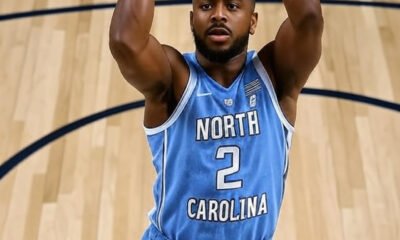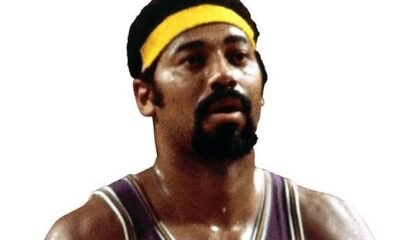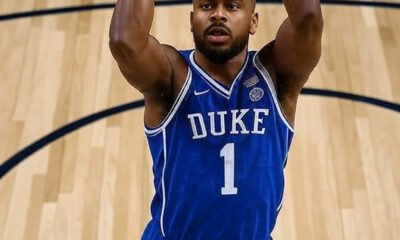Blog
No.1 top player in America gives reasons for Comitting to Duke Blues basketball over Tennessee vols and Georgia
Breaking News: No. 1 Top Player in America Commits to Duke Blue Devils Over Tennessee and Georgia — An In-Depth Breakdown
In a stunning turn of events that has sent shockwaves through the college basketball world, the nation’s top-ranked recruit for the class of 2024, **Cameron “Cam” Carter**, has officially announced his decision to commit to Duke University’s Blue Devils, surpassing offers and interest from renowned programs like the Tennessee Volunteers and Georgia Bulldogs. This decision not only reshapes recruiting expectations but also highlights the evolving priorities of elite high school athletes in choosing their college programs.
—
### The Recruitment Race: A High-Stakes Battle
Cameron Carter, a 6-foot-9 forward from Chicago, Illinois, emerged on the national scene early in his sophomore year, thanks to his exceptional combination of size, athleticism, court vision, and scoring ability. As the top-ranked player in the nation, Carter became a coveted prospect for elite programs across the country.
Throughout the summer, Carter’s recruitment was intensely competitive. On one side, the Tennessee Volunteers, under coach Rick Barnes, showcased their recent success in developing NBA-caliber talent and their competitive SEC schedule. On the other, the Georgia Bulldogs, Carter’s home state team, emphasized regional pride, familiarity, and a burgeoning program on the rise under coach Mike White.
However, the Blue Devils, with their storied history of success, legendary alumni, and reputation for player development, emerged as the frontrunners. Carter’s decision to commit to Duke was finalized after months of deliberation, visits, and conversations with coaching staff and family.
—
### Reasons Behind Cameron Carter’s Decision to Choose Duke
**1. Program Tradition and Legacy of Success**
One of the most significant factors influencing Carter’s decision was Duke’s unparalleled basketball tradition. The program’s 5 NCAA championships, the number of NBA stars it has produced, and its reputation for fostering individual talent make it a magnet for elite prospects.
Carter expressed admiration for Duke’s legacy during his announcement. “Duke has always been a dream school,” he stated. “The history, coaching staff, and the way they develop players for the next level is unmatched. I want to be part of that tradition and contribute to the program’s continued success.”
**2. Coaching Excellence and Player Development**
Carter emphasized the importance of the coaching staff, particularly Head Coach Jon Scheyer, a former Duke star himself, now leading the program with a focus on player growth and team success. The coaching staff’s track record of nurturing top recruits into NBA-ready players was a decisive factor.
“Coach Scheyer and his staff are proven winners,” Carter said. “They focus on developing your strengths and making you a complete player. That’s what I want—an environment where I can grow both as a player and as a person.”
**3. Style of Play and System Fit**
Duke’s versatile, fast-paced style of basketball aligns perfectly with Carter’s skill set. The team emphasizes ball movement, perimeter shooting, and aggressive defense, offering Carter the opportunity to showcase his ability to play multiple roles on the court.
He noted, “Duke’s style fits my game perfectly. I love playing both inside and outside, and their system allows me to do that effectively.”
**4. Academic and Campus Environment**
Beyond basketball, Carter values the academic reputation of Duke University. The university’s rigorous academics, combined with a vibrant campus life, appealed to his desire for a balanced college experience.
“Education is important to me,” Carter said. “Duke offers top-tier academics, and I want to prepare myself for life after basketball.”
**5. Personal Relationships and Trust**
Carter highlighted the strong relationship he developed with Coach Scheyer and his staff during visits and conversations. The transparency, warmth, and genuine interest shown by the coaching staff played a pivotal role in his decision.
“From the beginning, they made me feel like family,” Carter explained. “That trust and connection made me confident that I’m making the right choice.”
**6. Family and Long-Term Goals**
Carter’s family prioritized his development both as a player and as an individual. They were impressed by Duke’s reputation for supporting student-athletes academically and athletically.
“My family wanted me to go where I’d be pushed to succeed but also where I’d be in a safe and supportive environment,” Carter said. “Duke checks all those boxes.”
—
### Why Not Tennessee or Georgia?
While Tennessee and Georgia presented compelling cases, Carter’s decision to pass on these regional programs was influenced by several nuanced factors:
– **Tennessee’s Rising Program:** Tennessee’s recent success under Rick Barnes and their competitive SEC schedule were attractive, but Carter felt that Duke’s national prominence and history of developing NBA players offered a better platform for his aspirations.
– **Georgia’s Familiarity:** Being from Chicago and with Georgia close to his hometown, Carter considered Georgia’s regional appeal. However, he expressed a desire to challenge himself in a nationally competitive environment, which Duke provides.
### Implications for College Basketball
Carter’s commitment to Duke underscores the program’s persistent ability to attract the nation’s top talent, reaffirming its status as a powerhouse for developing future NBA stars. It also signifies a broader trend where elite recruits prioritize program history, coaching staff quality, and player development over regional proximity.
For Tennessee and Georgia, missing out on Carter is a setback but also an opportunity to pivot and focus on other high-potential recruits. Their programs remain competitive, but Carter’s choice highlights the importance of legacy and development that Duke offers.
### Broader Analysis: What This Means Moving Forward
Cameron Carter’s decision embodies the evolving priorities of top-tier recruits. More than just playing close to home, elite prospects are seeking out programs with proven success in player development, a culture of excellence, and a coaching staff committed to their growth.
This trend is likely to influence recruiting strategies nationwide, with programs emphasizing their success stories, coaching stability, and player pathways to the NBA.
### Final Thoughts
Cameron Carter’s commitment to Duke is a testament to the program’s enduring appeal and reputation for excellence. His decision exemplifies how top recruits weigh tradition, coaching, style of play, academics, and personal relationships when making one of the most important choices of their athletic careers.
As Carter prepares for his freshman season, expectations will be high. Fans and analysts alike will be eager to see how his versatile game translates on the college stage and how he contributes to Duke’s pursuit of another NCAA championship.
### In Conclusion
Cameron Carter’s choice to wear Duke blue over regional rivals Tennessee and Georgia underscores a pivotal shift in recruitment dynamics. For Carter, it’s about more than just basketball; it’s about aligning with a program that offers a legacy of success, a system tailored to his strengths, and an environment where he can thrive academically and personally.
This decision not only elevates Carter’s profile but also reinforces Duke’s position as a premier destination for the nation’s elite talent—an environment where future stars are groomed for greatness.
-

 Arsenal2 years ago
Arsenal2 years agoSad News Arsenal ex player who is goal scorer confirmed dead this morning
-

 Liverpool2 years ago
Liverpool2 years agoSad News Sadio Manè Confirmed Dead Today By Sky Sports Reporters, Open For Full Story 👇
-

 Blog1 year ago
Blog1 year ago“I was forcefully removed from Manchester United squad and now I’ve joined the best team in the world…I will revenge and as a result, I’ve ordered my friend who’s their best player currently to leave there with immediate effect and he has agreed”: Former Man United player angered by United decision to removed him from the squad as he ordered the Club’s best player to leave immediately.
-

 Blog1 year ago
Blog1 year agoSad News: Manchester United player died when playing for his country England yesterday 😢 😔
-

 Blog2 years ago
Blog2 years agoR.I.P: Formal Real Madrid and France international confirm death this morning
-

 Chelsea2 years ago
Chelsea2 years agoBreaking New:”Roman Abramovich could get Chelsea back”? Chelsea owner review the conversation between him and Roman Abramovich in. Deal about getting Chelsea back
-

 Blog2 years ago
Blog2 years agoUNBELIEVABLE: Manchester City midfielder KELVIN DE BRUYNE divorced wife this morning after DNA test revealed their 5 years old son belongs to formal Manchester United player
-

 Manchester United1 year ago
Manchester United1 year agoOFFICIAL NOW: Manchester United announce the signing of 23yr sensational player after beating Liverpool and Madrid for His signature, agreement reached on a 5yr deal, Medical completed – announcement ongoing












